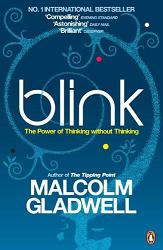This is the first non fiction book I’ve read in a long time. It’s been years! But I thought “Let’s read something that improves my understanding of the world around me”. I didn’t want a biography or anything about science since I’ve had my fill of the latter. I found some books by Malcolm Gladwell and “Blink” came highly recommended.

It’s about the power of our unconscious mind. Gladwell asserts that our subconscious processes information much faster than our conscious mind and that often a “snap judgment” by a competent person is worth far more than tomes of analysis. He presents a lot of examples and makes an interesting case. He then goes on to show the various aspects of our unconscious mind and how people are more or less unaware of their prejudices and preferences.
I really liked being told about Harvard’s Implicit Association Tests (IAT) which allowed me to try and get a grip on some of my own hidden prejudices. It’s things like this that made the book worthwhile for me.
At the same time, I found the emphasis on snap judgments to be a little over the top. My experience is that people are far more likely to judge wrongly about something based on their prejudices. To be sure, Gladwell addresses this issue in the book as well. He says that for a “blink” to be useful, it has to be made by a trained person in situations where their prejudices don’t get a chance to come into play.
There is indeed something to be learned from this – as long as you don’t subscribe to the “magical unconscious” bit too seriously. But it’s tough for me to see how any of this can be applied in real life by regular people like us when even experts can go wrong – as an example in the end demonstrated where top conductors systematically pre judged women performers by simply assuming they couldn’t play as well as men.
It requires a great deal of self understanding to know when you’re prejudiced, to accept it, and to take steps to ensure that you’re not exposed to them. But if those conditions can be replicated, then there is certainly scope for taking one’s first impressions seriously in the “blink” of an eye.
The book had far too many detailed examples for my taste – I like the author to get to the point fast. And I can see why it’s a hit in MBA schools since it talked a lot of about marketing, market research, and consumer preferences. Perhaps it was designed with that end in view.
